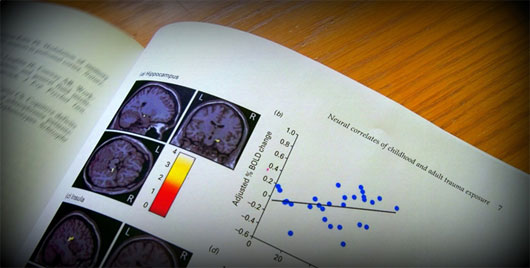Psychological Medicine

Childhood and adult trauma both correlate with dorsal anterior cingulate activation to threat in combat veterans
Herringa RJ, Phillips ML, Fournier JC, Kronhaus DM, Germain A
Childhood maltreatment is a major risk factor for the development of posttraumatic stress symptoms (PTSS) following trauma in adulthood. Yet, the brain mechanisms underlying this vulnerability remain poorly understood. This study, led by Dr. Ryan Herringa with the support of the American Academy of Child and Adolescent Psychiatry Pilot Research Award, examined the neural correlates of childhood maltreatment, adult trauma exposure (combat), and PTSS in 28 male military Veterans who served in Iraq and Afghanistan. Veterans were recruited through the Veterans Sleep Studies Research Program (http://www.veteranssleep.pitt.edu). Veterans underwent functional magnetic resonance imaging while completing an emotion processing task.
Results showed that both childhood and adult trauma exposure were associated with increasing activation of the dorsal anterior cingulate cortex in response to threat stimuli. This brain region is involved in the expression of fear, and the results suggest that both early and adult trauma exposure may sensitize this region to threat. In comparison, PTSS was associated with increasing activation in limbic regions involved in fear responses. Thus, childhood and adult trauma may sensitize a fear regulatory area of the brain towards the promotion of fear responses, upon which additional changes in fear circuitry may emerge in the development of PTSD symptoms.
This study was published online in the October 2012 issue of Psychological Medicine. Click here for a link to the abstract.
Contributors:
Anne Germain, PhD, and Mary L. Phillips, MD, JC Fournier, PhD (Department of Psychiatry, University of Pittsburgh School of Medicine, Pittsburgh)
Ryan Herringa, M.D., Ph. D. (Department of Psychiatry, University of Wisconsin School of Medicine and Public Health, Madison, WI)
Dina M. Kronhaus, PhD. (St Catharine's College, Cambridge, UK; Computer Laboratory, University of Cambridge, UK)
